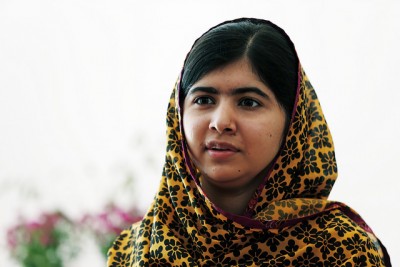The Norwegian Nobel Committee sought to “give children hope” on Friday, according to its chairman Thorbjørn Jagland, when he announced it would award the Nobel Peace Prize for 2014 jointly to 17-year-old Malala Yousafzai of Pakistan and 60-year-old Kailash Satyarthi of India. Both were lauded for “their struggle against the suppression of children and young people, and for the right of all children to education.”

Malala Yousafzai, who won fame after surviving an assassination attempt by the Taliban and then continuing her efforts to ensure education for girls, had been among the favourites to win the prize. Kailash Satyarthi hasn’t had the same amount of international media attention, but Nobel Committee Chairman Thorbjørn Jagland claimed he also has shown “great personal courage” in maintaining Gandhi’s tradition as he headed various forms of protests and demonstrations to fight child labour. He has battled exploitation of children for decades and, according to the committee, “contributed to the development of important international conventions on children’s rights.”

Malala Yousafzai is by far the youngest winner ever of the Nobel Peace Prize. Her age had been viewed as a strike against her candidacy because winning the prize can be a major burden to bear. Jagland noted, however, that she already has won many other major prizes and has been a strong voice at the United Nations and other large international groups. She has impressed leaders around the world, taken part in campaigns for girls and women and become a leading spokesperson for girls’ rights to education especially in cultures where girls are oppressed. She declined to comment on winning the Nobel Peace Prize until her school day where she’s now living in England was over.
Jagland said this year’s prize was also meant to send a strong signal against the extremism that’s causing so much conflict and brutality in the world today. If children and youth have access to education and aren’t commercially exploited, the committee reasoned, they’ll have more hope for the future and therefore become less likely to be attracted by extremism. That doesn’t explain why some young Norwegians, who enjoy among the best educational and job opportunities in the world, have resorted to extremism, but the committee seemed to believe its prize could help fight recruitment elsewhere.
The committee also felt it was important “for a Hindu and a Muslim, an Indian and a Pakistani, to join in a common struggle for education and against extremism.”
Denied there was disagreement
The committee’s decision was made after what had seemed to be an unusual amount of disagreement among its members. Speculation, as usual, had been swirling for weeks around who would win the prize. Local experts who follow the Peace Prize process closely had called the committee’s need for extra negotiations as late as this week “extraordinary.” Their extra sessions indicate they didn’t actually settle on the winner until late in the process, after more than half-a-year of deliberations since nominations closed last winter.
Jagland denied, however, that the selection was more difficult than in other years. “It wasn’t especially difficult, with so many good candidates,” Jagland said.
Nominees ranged from Pope Frances to whistle-blower Edward Snowden. The five-member committee had sorted through a record 278 nominations, 47 of which were organizations and the rest individuals.
There’s been an unusual amount of attention paid to the Norwegian Nobel Committee in recent years, following some of its surprise and controversial decisions on winners, not least US President Barack Obama in 2009. Its five members are formally appointed by the Norwegian Parliament in accordance with the will of Swedish prize benefactor Alfred Nobel. He wanted the Peace Prize to be awarded by a committee that reflected the political make-up of the Norwegian Parliament at a time when Norway was still part of an involuntary political union with Sweden.
While all the other Nobel Prizes are awarded in Sweden by Swedish organizations, Nobel wanted the Norwegians to have responsibility for the Peace Prize as Norway itself agitated for full independence from Sweden. Norway became its own sovereign nation in 1905 and the Norwegian Nobel Committee has continued to choose the winners of the Peace Prize. Even though its members are appointed by the Parliament, the committee operates independently and its decisions do not reflect government policy.
newsinenglish.no/Nina Berglund

